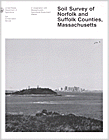
The following is a map unit description from the "Soil Survey of Norfolk and Suffolk Counties, Massachusetts (Peragallo, 1989)"

Fp-Freetown muck, ponded. This is a very deep, nearly level, very poorly drained and ponded organic soil in depressions and along streams and rivers. Areas are round and elongated in shape and range from 6 to 30 acres.
Typically, the surface layer is black muck about 13 inches thick. The subsurface layer is dark brown and black muck about 16 inches thick. The bottom layer is black muck to a depth of 60 inches or more.
Included with this soil in mapping are a few small areas of ponded Scarboro and Swansea soils near the edge of the map unit, and a few areas of unponded Freetown soils, Also included, in the southwest part of the survey area, are some small areas that have 6 to 12 inches of coarse sand on the surface. The included areas make up about 15 percent of the map unit.
Soil properties:Permeability: Moderate or moderately rapid.
Available water capacity: Very high.
Soil reaction: Extremely acid.
Depth to bedrock: More than 60 inches.
Seasonal high water table: 0 to 3 feet above the
surface.
Hydrologic group: D.
Most areas of this soil are completely covered with water and have emergent wetland vegetation typical of freshwater marshes. A few small areas have controlled drainage and are used for cranberry production. Areas of these soils provide excellent habitat for wetland wildlife.
This soil generally is not suitable to most uses because of the ponded surface and low soil strength. Drainage of the soil is difficult because of its position on the landscape and because adequate outlets are not available.